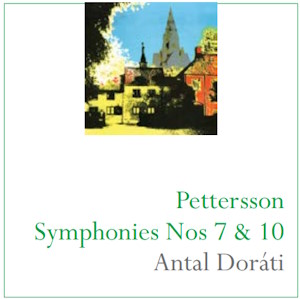
Allan Pettersson (1911-1980)
Eight Barefoot Songs (arr. Doráti)
Symphony 7
Symphony 10
Hakan Hagegard (baritone)
Stockholm Philharmonic (songs, 7), Swedish Radio Symphony Orchestra (10)/Antal Doráti
rec. live, 18-20 September 1979 Konzerthuset, Stockholm (songs, 7); 13-14 June 1974, Circus Djurgarden, Stockholm (10)
Interview in Swedish
Antal Doráti Society ADL315 [2 CDs: 111]
The Swedish composer Allan Pettersson has been on the outer fringes of my musical awareness for a long time without my having actually heard anything by him. So I was pleased to receive this double CD for review, particularly as it contains the work in the recording which got Pettersson’s music known to a wider public, Antal Doráti’s recording of the seventh symphony. About Pettersson I learned that he had a difficult start, with an alcoholic blacksmith father who disapproved of Allan’s interest in music. He taught himself the violin, later the viola, and studied with several masters. He played for a time as a violist, but he suffered from rheumatoid arthritis which brought an end to his playing career. He lived in considerable poverty and isolation with only his wife for company and concentrated on composing. Later, after winning some recognition, he received support from the state.
Among his first compositions was the set of Barefoot Songs, to his own words. Pettersson wrote over a hundred poems but set only twentyfour of them, for voice and piano. The title comes from a line in Der Leiermann, the last song in Schubert’s Winterreise, ‘barefoot on the ice’ in English. I understand that the lyrics are melancholy and quite cryptic. Doráti orchestrated eight of them, in a cycle lasting half an hour, and this we have on the first disc. I have not been able to find texts or translations online, but I did find English versions of the titles of those Doráti chose:
- The Lord Walks in the Meadow
- Wise Men and Clenched Hands
- Flower, Tell Me
- The Maiden and the Lying Wind
- While the Flies are Buzzing
- Telling Lies
- My Yearning
- Death of a Fiddler
They are largely gentle folk-like songs, showing some influence from Grieg and Schubert. Hakan Hagegard does them proud. Pettersson later drew on them for his symphonies, so perhaps they were for him a continuing source of inspiration in the way that Des Knaben Wunderhorn was for Mahler. The first disc is completed by a ten minute interview in Swedish, a language I do not know so I cannot comment on it.
The second disc begins with that seventh symphony. This lasts about fortyfive minutes but plays continuously in one movement. It appears that most if not all Pettersson’s sixteen symphonies are in one movement. I have mentioned Mahler, and the idiom seems to me very like the Mahler of the first two movements of his fifth symphony, that is to say, late romantic, passionate and anguished. It falls into a number of sections and is vivid and well scored. Particularly impressive were the last few minutes, although they sounded so close to Shostakovich as to be almost a pastiche. However, the thematic material is in general not as immediately memorable as Mahler and I think one would need to listen to it several times, ideally with a score in hand, fully to appreciate it.
The disc is completed with the tenth symphony, also in one movement but only about half the length of the seventh. It is equally unremittingly intense, but it has more rhythmic vitality and clearer thematic working. It builds up to a fine climax with a long line in the strings, followed by what seemed to me an excessively prolonged coda. The idiom here seems to have borrowed something from the explosiveness of Varèse’s two large-scale orchestral works, Amériques and Arcana, but I may be simply noting a similarity rather than an influence.
Doráti excelled in untangling complex modern works of this kind, and it is not surprising that this version of the seventh symphony, first issued on Swedish Society Discofil, should have become a classic. This has been reissued several times. That of the tenth appears here on CD for the first time – it was originally on a vinyl disc from EMI. Doráti made more than one recording of his version of the Barefoot Songs, but this is the first appearance of this one. There are, in fact, several other versions of the songs, including a complete set of the piano versions as well as others of Doráti’s orchestral group. All Pettersson’s symphonies have now been recorded by BIS, who have also recorded all his other works, so that curious listeners can explore them at leisure. They have also mostly been reviewed on MWI.
Despite their age, the recordings have come up well and there is no need for hesitation on that account. The discs come with front and back covers for a slimline two disc jewel case, but this is not provided and there are no notes other than the details of the recordings. For the Pettersson novice this is a valuable introduction; for old hands these are classic versions.
Stephen Barber
Availability: Doráti Society (email)


















